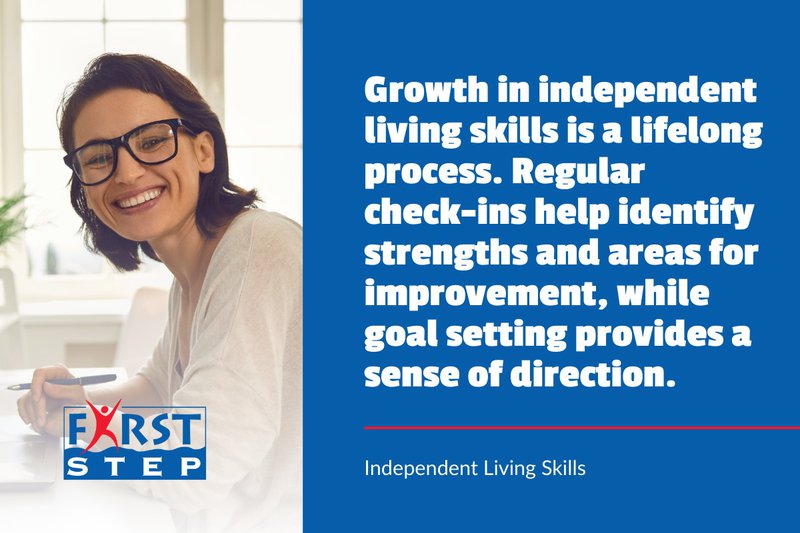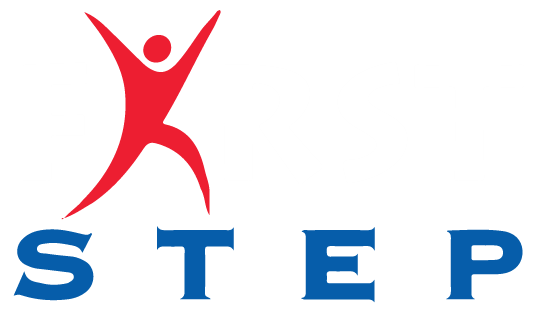For young people with disabilities, the transition into adulthood is a major milestone. Caregivers often ask the same question: What does my child need most to succeed on their own? The answer lies in building a strong foundation of independent living skills—practical abilities that support daily life, personal growth, and community participation.
This guide explores the essential independent living skills every young adult should practice, with strategies for building them gradually. Caregivers, teachers, and service providers can use these tools to prepare teens for greater independence and lifelong success.
Key Takeaways
- Independent living skills include personal care, cooking, money management, home care, transportation, shopping, communication, and time management.
- Youth should practice hygiene daily, manage medications safely, and build consistent sleep routines.
- Cooking and meal planning save time, reduce waste, and improve nutrition.
- Budgeting and money skills allow teens to track spending, pay bills on time, and save for emergencies.
- Transportation skills support access to school, work, and community activities.
- Home care routines promote safety, health, and reduced stress.
- Self-advocacy and communication build confidence and stronger relationships.
- Time management tools improve focus, reduce stress, and support independence.
- Job readiness skills—applications, resumes, and interview prep—help youth enter the workforce.
- Leisure activities and social engagement support mental health and belonging.
- Growth should be tracked with checklists, evolving goals, and supportive mentors.
Independent Living Skills: Why They Matter
Independent living skills empower youth to care for themselves, navigate responsibilities, and enjoy greater freedom. These skills cover everything from cooking and cleaning to managing money, transportation, and time. Developing them step by step not only boosts confidence but also reduces the need for constant support. For more background on why these skills matter, see Master Independent Living Skills Today.
Personal Care and Daily Hygiene
The Foundation of Independent Living Skills
Personal care is the starting point for every independent living journey. Daily hygiene and health habits allow young adults to present themselves confidently, stay healthy, and prepare for other responsibilities. Without these routines, wellness and social participation can quickly decline.
Essential Hygiene Practices
Youth should practice the following as part of daily care:
- Bathing and grooming: Bathe daily, brush teeth twice a day, and use deodorant.
- Hair and clothing: Keep hair neat and wear clean, weather-appropriate clothes.
- Oral care: Regular brushing and flossing prevent dental problems and improve confidence.
- Sleep hygiene: Develop a consistent bedtime, reduce screen use before sleep, and create a quiet environment to support rest.
Medication Management
Medication safety is another crucial component of independent living skills.
- Use a pill organizer labeled by day and time.
- Set phone alarms or calendar reminders for each dose.
- Keep a printed or digital list of medications with dosage and timing.
- Store medications in a consistent, safe location.
- Refill prescriptions before supplies run out.
These habits reduce stress and prevent missed doses, allowing youth to focus on school, work, and social activities.
Building Habits That Stick
Consistency transforms self-care from effort into routine. To help teens build habits:
- Create a visual checklist of daily hygiene steps.
- Place toiletries and care items in the same location every day.
- Encourage youth to track progress with a planner or app.
- Celebrate small milestones to boost motivation.
Daily personal care sets the stage for greater independence, providing the confidence and health needed to manage other areas of life.
Independent Living Skills: Food Shopping and Cooking
Why Food Skills Matter
Feeding oneself is a cornerstone of independent living. Without the ability to cook and shop, young adults often depend on fast food or others to provide meals. By practicing basic cooking, nutrition, and grocery shopping skills, youth gain control over their health, budgets, and daily routines.
Cooking Basics
Safe and simple cooking is the first step. Skills should include:
- Kitchen safety: Learning how to boil water, use knives safely, and operate a stove or microwave.
- Simple meals: Cooking pasta, rice, eggs, or basic proteins.
- Food safety: Washing hands, cleaning surfaces, and storing food properly to prevent waste and illness.
- Meal prep habits: Cleaning as you go, labeling leftovers, and re-using ingredients to stretch meals further.
Cooking does not require advanced culinary skills—it simply requires consistency and practice. Even small steps, such as preparing breakfast or reheating leftovers, build confidence and independence.
Meal Planning for Independence
Meal planning supports better nutrition, reduces waste, and saves money. A simple three-step approach includes:
- Check what’s on hand (pantry, fridge, freezer).
- Choose 3–4 main meals for the week.
- Write a list of missing items.
Encouraging youth to rotate meals helps reduce overwhelm and prevents unnecessary food waste.
Grocery Shopping Independent Living Skills
Shopping is more than just picking items off the shelf—it’s a structured life skill. Young adults should practice:
- Making a list and sticking to it.
- Setting a budget and tracking costs while shopping.
- Comparing prices between brands and store options.
- Reading nutrition labels to make healthier choices.
- Shopping smart by eating before shopping, buying generic when possible, and checking expiration dates.
Storing food in clear containers with dates marked helps reduce spoilage and builds awareness of food safety.
Independent Living Skills: Making Healthy Choices on a Budget
Many teens worry about affording healthy food. Strategies include:
- Buying frozen vegetables and fruits, which last longer.
- Choosing whole grains for meals.
- Using leftovers creatively—like turning roast chicken into soup.
- Shopping store brands or sales to stretch money further.
By practicing these independent living skills, youth gain not only better nutrition but also the confidence to manage one of the most essential aspects of independent living skills: feeding themselves well.
Independent Living Skills: Money Management and Financial Literacy
Why Money Skills Are Critical
Financial independence is often the hardest but most rewarding milestone. Poor money management can lead to stress, debt, and dependence, while strong budgeting habits allow youth to live securely and plan for the future.
Developing financial literacy is one of the most empowering independent living skills because it impacts nearly every other area—housing, food, transportation, and social life.
Independent Living Skills: The Budgeting Basics
A budget is a plan for every dollar earned and spent. Youth should learn to:
- List all income (allowance, wages, benefits).
- Track fixed expenses (rent, utilities, transportation).
- Account for variable costs (food, entertainment).
- Set aside savings before spending on wants.
Free apps like Mint or EveryDollar can simplify this process and provide a visual record of where money goes each week.
For a deeper dive, check out First Step’s list of available blogs.
Distinguishing Needs vs. Wants
Understanding the difference between needs and wants is central to responsible money management.
- Needs: housing, groceries, medicine, transportation.
- Wants: new clothes, fast food, and entertainment.
When money is limited, focusing on needs first prevents debt and ensures stability. A useful strategy is asking: “Will I still want this later?” If not, it’s likely a want, not a need.
Paying Bills on Time
Timely bill payment prevents late fees and builds credibility. Habits that help include:
- Calendar alerts for due dates.
- Paper or digital planners to track monthly obligations.
- Auto-pay for recurring bills like rent or internet.
These routines reduce stress and help build trust with landlords, utility companies, and employers.
Building Emergency Savings
Unexpected costs—car repairs, medical needs, or broken appliances—can quickly derail independence. A small emergency fund provides a safety net. Strategies include:
- Setting aside $5–$10 per week.
- Using cash envelopes labeled “food,” “fun,” and “savings.”
- Avoiding dipping into emergency savings for non-urgent wants.
Over time, even modest amounts grow into meaningful protection.
Independent Living Skills: Banking
In addition to budgeting, youth should learn to:
- Open and manage a basic bank account.
- Deposit checks through mobile banking.
- Monitor account balances to avoid overdrafts.
- Recognize and avoid scams or predatory lending.
These financial literacy skills prepare youth for larger responsibilities such as rent, car ownership, or future credit building.
Asking for Help Early
Financial struggles are common, and asking for help early can prevent problems from escalating. Caregivers, mentors, or financial coaches can provide guidance, tools, and reassurance. Encouraging open conversations about money reduces stigma and builds stronger habits.
Developing financial literacy ensures that young adults can manage expenses, avoid debt, and pursue long-term goals. As one of the most practical independent living skills, money management paves the way for a secure and confident future.

Independent Living Skills: Communication and Self-Advocacy
Strong communication and self-advocacy skills are essential for thriving in school, work, and community life. These independent living skills empower young people to express their needs, set boundaries, and build relationships that support long-term independence.
Building Effective Communication Skills
- Verbal communication: Speaking clearly, maintaining eye contact, and adjusting tone and volume to the setting.
- Non-verbal communication: Understanding body language, facial expressions, and personal space.
- Listening skills: Practicing active listening, repeating back information when needed, and asking clarifying questions.
Practicing Self-Advocacy
- Identifying needs: Recognizing when accommodations, supports, or extra time are required.
- Making requests: Politely but firmly asking for help or resources.
- Problem-solving: Approaching conflicts with confidence and respect.
Time Management and Executive Functioning
Time management plays a central role in mastering independent living skills. Many young people struggle with balancing school, work, and personal responsibilities. Developing executive functioning skills helps transform overwhelming schedules into manageable routines.
Independent Living Skills: Tools for Better Time Management
- Calendars and planners: Using digital apps or paper planners to track appointments, assignments, and bills.
- Checklists: Breaking tasks into smaller steps to reduce stress and increase focus.
- Prioritization: Learning to separate urgent tasks from long-term goals.
Strengthening Executive Functioning
- Organization: Keeping personal and work spaces tidy reduces distractions.
- Impulse control: Thinking through decisions before acting.
- Flexibility: Adapting when plans or routines change unexpectedly.
Independent Living Skills For Career Preparation
Employment is often the milestone that defines independence. Independent living skills prepare young adults for the workplace by focusing on job readiness, professionalism, and long-term career development.
Preparing for Employment
- Resume building: Highlighting education, skills, and volunteer experience.
- Interview skills: Practicing introductions, handshakes, and answering common questions.
- Workplace behavior: Understanding punctuality, dress codes, and teamwork.
Career Growth and Stability
- Networking: Connecting with mentors, teachers, and community leaders.
- Training and certifications: Enrolling in vocational programs or continuing education.
- Self-advocacy at work: Requesting accommodations and communicating with supervisors.
Leisure, Community, and Social Connection
Independent living skills extend beyond basic needs. Recreation and social connection are just as important for maintaining balance, reducing stress, and building friendships.
Social Engagement
- Community activities: Joining local clubs, sports, or recreational programs.
- Volunteer opportunities: Gaining experience while giving back.
- Building friendships: Maintaining healthy relationships through communication and trust.
Wellness Through Leisure
- Physical activity: Staying active supports both physical and emotional health.
- Creative outlets: Engaging in music, art, or writing to boost self-expression.
- Mindfulness practices: Learning techniques like yoga or meditation for stress management.
These skills enhance resilience, motivation, and joy in everyday life. For more information, explore this guide to Building Inclusive Community.
Tracking Progress and Setting Goals
Growth in independent living skills is a lifelong process. Regular check-ins help identify strengths and areas for improvement, while goal setting provides a sense of direction.
Measuring Success
- Self-assessments: Tracking how well daily responsibilities are being managed.
- Feedback from others: Gathering input from parents, caregivers, or mentors.
- Progress charts: Using visual tools to celebrate small wins.
Goal Setting Techniques
- SMART goals: Specific, Measurable, Achievable, Relevant, and Time-bound steps.
- Short-term goals: Daily or weekly tasks like cooking meals or budgeting.
- Long-term goals: Securing employment, living independently, or pursuing higher education.
Building a Foundation for Lifelong Independence
Independent living skills empower individuals to thrive in every area of life—from personal care and financial management to employment and community participation. With structured practice, supportive resources, and consistent goal setting, these skills create a strong foundation for independence and self-confidence.
Empowering Adults With Disabilities To Live Independently
Empower yourself or a loved one with the skills needed for confident, independent living. At First Step, Inc., compassionate support and personalized programs are available to guide every stage of the journey. If building independence is the next step, reach out today to explore these opportunities. Together, a pathway to independence and an enriched quality of life can be created.


